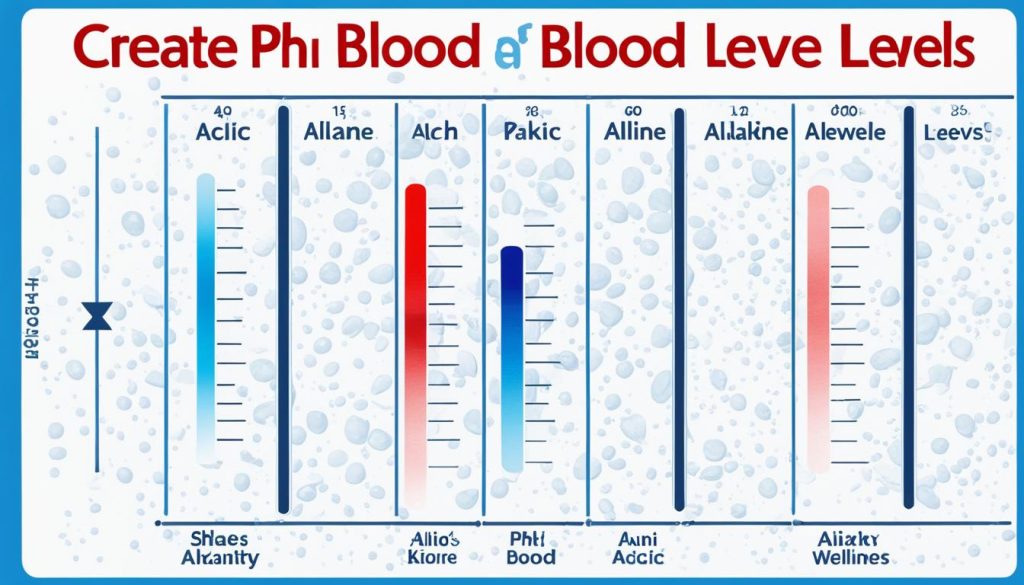Hello, I’m here to provide you with valuable alkaline eating tips and how it can help you achieve a balanced pH for a healthier body. The alkaline diet has gained popularity in recent years, focusing on consuming alkaline foods to improve your overall well-being.
The concept behind the alkaline diet is that certain foods can affect the pH levels in your body. By consuming alkaline foods, you can strive for a more alkaline pH, which is believed to contribute to better health and disease prevention. On the other hand, acidic foods are thought to promote an acidic pH, which may increase vulnerability to illness.
An alkaline diet encourages the consumption of whole, unprocessed foods while limiting processed foods, meat, dairy, and grains. Instead, it emphasizes alkaline-rich foods such as fruits, vegetables, nuts, and legumes. Additionally, alkaline water is often recommended to maintain a balanced pH.
While the alkaline diet may support overall health, it is important to note that it does not directly affect your body’s pH levels or have a significant impact on disease prevention. However, incorporating alkaline eating tips into your lifestyle can still offer various health benefits and promote a balanced nutrition approach. Now, let’s take a closer look at the key aspects and facts related to the alkaline diet.
Alkaline Eating Tips You Should Know
- Alkaline eating focuses on consuming whole, unprocessed foods
- Limit processed foods, meat, dairy, and grains for a more alkaline diet
- Incorporate alkaline-rich foods such as fruits, vegetables, nuts, and legumes
- Consider drinking alkaline water as part of your balanced nutrition
- The alkaline diet may offer overall health benefits
Understanding pH and Its Effects on the Body
pH is a crucial measurement of acidity or alkalinity in our bodies. It ranges from 0 to 14, with values lower than 7 considered acidic and values higher than 7 considered alkaline. Our body tightly regulates its pH levels to ensure optimal health.
For example, the stomach maintains highly acidic pH levels to aid in efficient digestion, while the blood has a slightly alkaline pH, typically ranging from 7.35 to 7.45. This delicate balance is vital for the proper functioning of our bodily systems.
While the alkaline diet emphasizes monitoring urine pH to maintain alkalinity, it’s worth noting that urine pH can fluctuate due to various factors and doesn’t directly reflect blood pH. Thus, tracking urine pH alone may not provide an accurate representation of our overall pH levels.
To maintain a balanced pH, it’s essential to adopt a holistic approach to health and wellness. This includes consuming a well-rounded diet that incorporates a variety of pH-neutral and nutrient-rich foods, such as fruits, vegetables, whole grains, and lean proteins.
To illustrate the importance of pH regulation, let’s take a closer look at the different pH levels in our body:
- Stomach: The stomach has a highly acidic pH, typically ranging from 1.5 to 3.5. This acidity is necessary for breaking down food and facilitating digestion.
- Blood: The blood maintains a slightly alkaline pH, with a range of 7.35 to 7.45. This tight regulation is essential for various bodily processes, including enzyme activity, oxygen transportation, and overall cell function.
It’s crucial to note that the alkaline diet’s impact on pH levels is minimal. While it promotes a healthy eating pattern, the direct influence on changing overall pH levels is limited. Our body has sophisticated mechanisms to maintain pH homeostasis, ensuring that our bodily systems function optimally.

Debunking the Acid-Forming Foods Myth
The alkaline diet proponents suggest that consuming acid-forming foods can negatively impact bone health and increase the risk of osteoporosis. This theory, known as the acid-ash hypothesis, proposes that when you consume acid-forming foods, your body extracts alkaline minerals from your bones to neutralize the acidity. However, scientific research does not support this claim.
Studies have found no significant association between dietary acidity and bone health. In fact, some evidence suggests that a high protein, acid-forming diet may actually improve bone health. Research suggests that such a diet contributes to increased calcium retention and hormone activation, both of which are beneficial for bone health.
It is essential to recognize that other factors, such as collagen loss and nutrient deficiencies, play a more significant role in bone health than dietary acidity alone. Therefore, focusing solely on the acid-forming properties of foods as a determinant of bone health may oversimplify the complex nature of bone health.

The Acid-Ash Hypothesis:
- The alkaline diet suggests that acid-forming foods lead to bone mineral density loss and increased osteoporosis risk.
- Consuming acid-forming foods is said to trigger the extraction of alkaline minerals from bones.
- Scientific research does not support this theory.
- Studies have found no significant association between dietary acidity and bone health.
- A high protein, acid-forming diet may actually promote better bone health through increased calcium retention and hormone activation.
- Factors such as collagen loss and nutrient deficiencies have a more significant impact on bone health.
Exploring the Alkaline Diet and Cancer Prevention
The alkaline diet has gained attention for its purported ability to prevent cancer by creating an alkaline environment in the body. Proponents of this idea claim that cancer cells thrive in an acidic environment and that consuming alkaline foods can make the body less hospitable to cancer growth. However, research does not support this claim.
While in vitro studies have shown that cancer cells grow in an acidic environment, it’s important to note that it’s the cancer cells themselves that create the acidic environment, not the other way around. Cancer cells undergo metabolic changes that result in the production of acidic byproducts, leading to an acidic tumor microenvironment.
Moreover, there is no evidence to suggest that altering the body’s pH through diet alone can have a significant impact on cancer prevention or treatment. The development and progression of cancer involve complex biological processes that cannot be solely influenced by dietary modifications.
While the alkaline diet may have other potential health benefits, such as increasing fruit and vegetable intake, promoting weight loss, and reducing inflammation, its ability to prevent or treat cancer remains unproven.
It’s important to approach cancer prevention and treatment under the guidance of healthcare professionals and to rely on evidence-based strategies such as regular screenings, a balanced diet, regular physical activity, and avoidance of smoking and excessive alcohol consumption.
The Benefits and Limitations of the Alkaline Diet
While the alkaline diet may not directly impact pH levels or have significant disease-fighting properties, it does offer some benefits. The emphasis on whole, unprocessed foods, fruits, vegetables, and plant-based proteins promotes overall health and can help reduce inflammation, lower the risk of chronic diseases such as heart disease, and support kidney health, especially for individuals with chronic kidney disease who need to limit protein intake.
Research suggests that a diet rich in fruits and vegetables, such as the alkaline diet, can provide important nutrients and antioxidants that contribute to heart health. The consumption of fiber-rich foods helps promote healthy digestion and may aid in weight management, which is crucial for maintaining heart health.
- Lowering inflammation: The alkaline diet’s focus on anti-inflammatory foods such as fruits and vegetables can help reduce chronic inflammation, which is associated with various health issues, including heart disease, diabetes, and autoimmune diseases.
- Supporting kidney health: The alkaline diet’s emphasis on promoting kidney health is particularly beneficial for individuals with chronic kidney disease. By limiting protein intake and ensuring the consumption of nutrient-rich plant-based foods, the alkaline diet can help manage kidney function.
In addition to these benefits, the alkaline diet encourages healthy eating habits and an overall balanced approach to nutrition. It promotes the consumption of nutrient-dense foods while limiting processed foods, added sugars, and unhealthy fats.
Conclusion
After exploring the alkaline diet and its various claims, it’s clear that while it may not directly impact pH levels, it does offer important benefits for overall health and wellbeing. The emphasis on whole, unprocessed foods, fruits, vegetables, and plant-based proteins promotes healthy eating habits and balanced nutrition. By incorporating these elements into your diet, you can support disease prevention, reduce inflammation, and improve heart and kidney health.
It’s important to approach the alkaline diet with realistic expectations and to consult with a healthcare professional. While the diet may not directly affect your body’s pH balance, the focus on nutrient-rich foods can still contribute to your overall health and wellbeing. Rather than obsessing over pH levels, prioritize a varied and balanced diet that includes a wide range of foods to ensure you’re getting all the necessary nutrients your body needs.
While the alkaline diet may not be the magic solution for achieving the perfect pH balance, it does provide a framework for healthy eating and balanced nutrition. By incorporating alkaline-rich foods and adopting a wholesome approach to your diet, you can enhance your overall well-being and support a healthy lifestyle.
FAQ
What is the alkaline diet?
The alkaline diet, also known as the acid-alkaline or alkaline ash diet, is based on the idea that eating certain foods can alter the pH of your body. It emphasizes consuming alkaline foods such as fruits, vegetables, nuts, and legumes, while limiting processed foods, meat, dairy, and grains.
Does the alkaline diet directly affect pH levels?
While the alkaline diet may support overall health, it doesn’t directly impact your body’s pH levels or have a significant impact on disease prevention. Your body tightly regulates its pH levels, and urine pH doesn’t directly reflect blood pH.
Does the alkaline diet affect bone health?
Scientific research does not support the claim that acid-forming foods lead to bone mineral density loss or increase the risk of osteoporosis. Factors like collagen loss and nutrient deficiencies play a more significant role in bone health.
Can the alkaline diet prevent cancer?
Research does not support the idea that altering the body’s pH through diet can significantly impact cancer prevention or treatment. Cancer cells create their own acidic environment, and the alkaline diet does not directly affect this process.
What are the benefits of the alkaline diet?
While the alkaline diet may not directly impact pH levels, it promotes overall health through the emphasis on whole, unprocessed foods, fruits, vegetables, and plant-based proteins. It can help reduce inflammation, lower the risk of chronic diseases, and support kidney health.
Is the alkaline diet a balanced approach to nutrition?
The alkaline diet encourages healthy eating habits and a balanced approach to nutrition. It’s important to consult a healthcare professional and prioritize a varied diet that includes a wide range of nutrient-rich foods.




